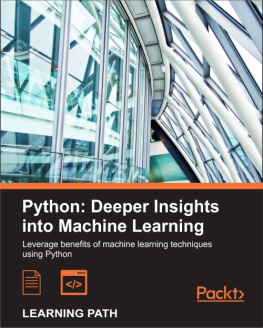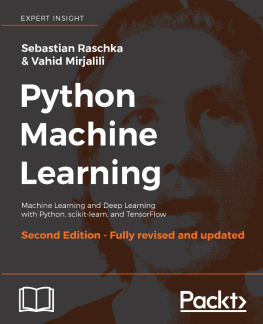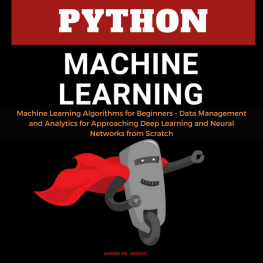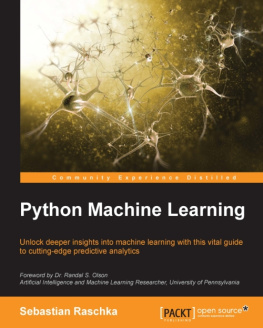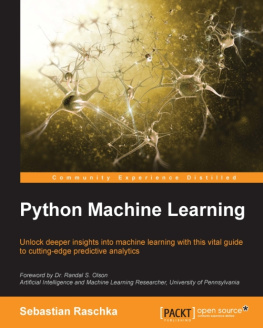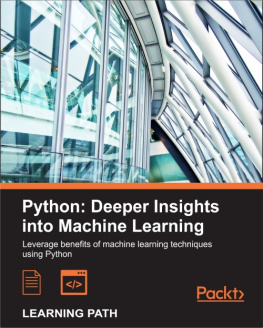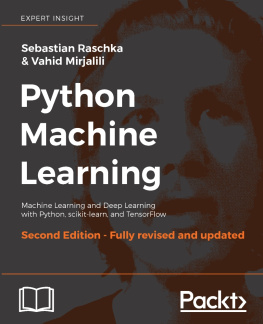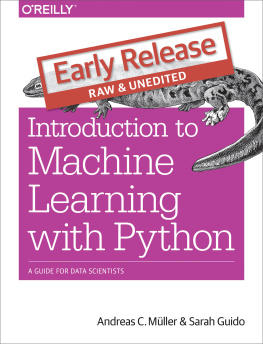Python: Deeper Insights into Machine Learning
Copyright 2016 Packt Publishing
All rights reserved. No part of this course may be reproduced, stored in a retrieval system, or transmitted in any form or by any means, without the prior written permission of the publisher, except in the case of brief quotations embedded in critical articles or reviews.
Every effort has been made in the preparation of this course to ensure the accuracy of the information presented. However, the information contained in this course is sold without warranty, either express or implied. Neither the authors, nor Packt Publishing, and its dealers and distributors will be held liable for any damages caused or alleged to be caused directly or indirectly by this course.
Packt Publishing has endeavored to provide trademark information about all of the companies and products mentioned in this course by the appropriate use of capitals. However, Packt Publishing cannot guarantee the accuracy of this information.
Published on: August 2016
Published by Packt Publishing Ltd.
Livery Place
35 Livery Street
Birmingham B3 2PB, UK.
ISBN 978-1-78712-857-6
www.packtpub.com
Credits
Authors
Sebastian Raschka
David Julian
John Hearty
Reviewers
Richard Dutton
Dave Julian
Vahid Mirjalili
Hamidreza Sattari
Dmytro Taranovsky
Dr. Vahid Mirjalili
Jared Huffman
Ashwin Pajankar
Content Development Editor
Amrita Noronha
Production Coordinator
Arvindkumar Gupta
Preface
Machine learning and predictive analytics are becoming one of the key strategies for unlocking growth in a challenging contemporary marketplace .It is one of the fastest growing trends in modern computing and everyone wants to get into the field of machine learning. In order to obtain sufficient recognition in this field, one must be able to understand and design a machine learning system that serves the needs of a project. The idea is to prepare a Learning Path that will help you to tackle the real-world complexities of modern machine learning with innovative and cutting-edge techniques. Also, it will give you a solid foundation in the machine learning design process, and enable you to build customized machine learning models to solve unique problems
What this learning path covers
, Python Machine Learning , discusses the essential machine algorithms for classification and provides practical examples using scikit-learn. It teaches you to prepare variables of different types and also speaks about polynomial regression and tree-based approaches. This module focuses on open source Python library that allows us to utilize multiple cores of modern GPUs.
, Designing Machine Learning Systems with Python , acquaints you with large library of packages for machine learning tasks. It introduces broad topics such as big data, data properties, data sources, and data processing .You will further explore models that form the foundation of many advanced nonlinear techniques. This module will help you in understanding model selection and parameter tuning techniques that could help in various case studies.
, Advanced Machine Learning with Python , helps you to build your skill with deep architectures by using stacked denoising autoencoders. This module is a blend of semi-supervised learning techniques, RBM and DBN algorithms .Further this focuses on tools and techniques which will help in making consistent working process.
What you need for this learning path
, Python Machine Learning will require an installation of Python 3.4.3 or newer on Mac OS X, Linux or Microsoft Windows. Use of Python essential libraries like SciPy, NumPy, scikit-Learn, matplotlib, and pandas. is essential.
Before you start, Please refer:
- The direct link to the Iris dataset would be: https://raw.githubusercontent.com/rasbt/python-machine-learning-book/master/code/datasets/iris/iris.data
- We've added some additional notes to the code notebooks mentioning the offline datasets in case there are server errors. https://www.dropbox.com/sh/tq2qdh0oqfgsktq/AADIt7esnbiWLOQODn5q_7Dta?dl=0
- .
- , Advanced Machine Learning with Python, leverages openly available data and code, including open source Python libraries and frameworks.
Who this learning path is for
This title is for Data scientist and researchers who are already into the field of Data Science and want to see Machine learning in action and explore its real-world application. Prior knowledge of Python programming and mathematics is must with basic knowledge of machine learning concepts.
Reader feedback
Feedback from our readers is always welcome. Let us know what you think about this coursewhat you liked or disliked. Reader feedback is important for us as it helps us develop titles that you will really get the most out of.
To send us general feedback, simply e-mail <>, and mention the course's title in the subject of your message.
If there is a topic that you have expertise in and you are interested in either writing or contributing to a book, see our author guide at www.packtpub.com/authors.
Customer support
Now that you are the proud owner of a Packt course, we have a number of things to help you to get the most from your purchase.
Downloading the example code
You can download the example code files for this course from your account at http://www.packtpub.com. If you purchased this course elsewhere, you can visit http://www.packtpub.com/support and register to have the files e-mailed directly to you.
You can download the code files by following these steps:
- Log in or register to our website using your e-mail address and password.
- Hover the mouse pointer on the SUPPORT tab at the top.
- Click on Code Downloads & Errata .
- Enter the name of the course in the Search box.
- Select the course for which you're looking to download the code files.
- Choose from the drop-down menu where you purchased this course from.
- Click on Code Download .
You can also download the code files by clicking on the Code Files button on the course's webpage at the Packt Publishing website. This page can be accessed by entering the course's name in the Search box. Please note that you need to be logged in to your Packt account.
Once the file is downloaded, please make sure that you unzip or extract the folder using the latest version of:
- WinRAR / 7-Zip for Windows
- Zipeg / iZip / UnRarX for Mac
- 7-Zip / PeaZip for Linux
The code bundle for the course is also hosted on GitHub at https://github.com/PacktPublishing/Python-Deeper-Insights-into-Machine-Learning.
Errata
Although we have taken every care to ensure the accuracy of our content, mistakes do happen. If you find a mistake in one of our coursesmaybe a mistake in the text or the codewe would be grateful if you could report this to us. By doing so, you can save other readers from frustration and help us improve subsequent versions of this course. If you find any errata, please report them by visiting http://www.packtpub.com/submit-errata, selecting your course, clicking on the

